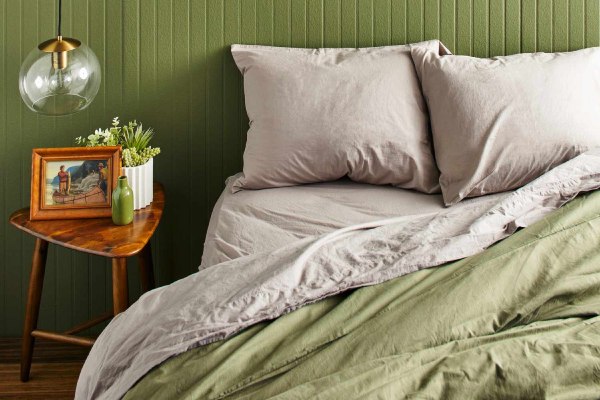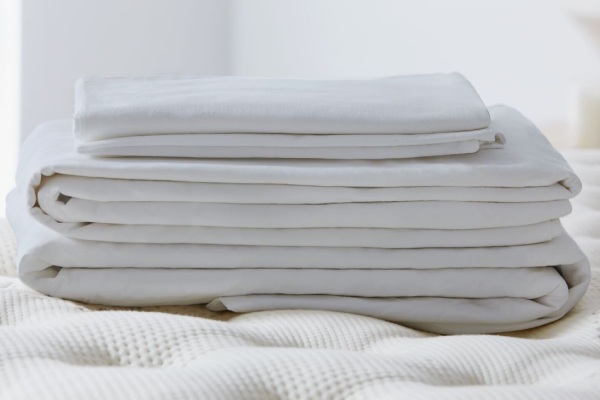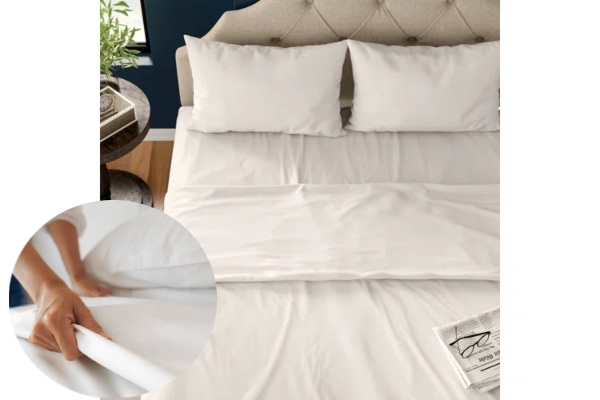Have you ever considered the lifespan of your bed sheets? Along with a comfy mattress, bed sheets play a significant role in facilitating proper sleep and keeping a regular bedtime routine. Most professionals in the bedding industry agree that a set of quality bed sheets lasts between two to five years with regular use. However, the factors that influence the lifespan of bed sheets include the quality of the fabric, frequency of use, laundering methods, and general care.
Today, we are here to discuss the longevity of bed sheets. Let’s get into it.
Bed Sheets Longevity: How Many Years Can You Expect?

When wondering about the longevity of bed sheets, various factors impact their durability, determining just how many years you can expect them to last. On average, a high-quality set of bed sheets can provide comfort and durability for more than five to ten years. However, this duration can be significantly extended with proper care.
On the other hand, cheaper sheets last between one to three years because they are made of synthetic materials and may require more frequent replacement. Ultimately, the quality and condition of bed sheets are crucial for a comfortable, hygienic sleep.
According to Rex Isap, CEO of Happy Beds, in general, the bed sheets last between 2 to 5 years. He says,
“Bed sheets generally have a lifespan of 2 to 5 years, influenced by care, weave, and material,”
Similarly, another professional Parima Ijaz, the CEO of Pure Parima, suggests high-quality Egyptian cotton bedding can last over 10 years. He says,
“The lifespan of your sheets truly depends on the quality, material, use, and care, If you choose high-end, quality sheets and properly care for them according to their care instructions, you can have reliable, long-lasting bedding that treats you to many sleepful nights to come.”
He further added,
“Some fabrics like linen and polyester do not keep very well after multiple washes and can start to deteriorate quicker, leading to more replacements.”
Professional Guidance on Bed Sheet Longevity: From Purchase to Replacement
Bed sheets are an important investment that is used daily in all households, therefore you should be familiar with bed sheet types, materials, and lifespan to ensure a deep, restful night’s sleep.
Materials
The material used in bed sheets has a significant impact on their quality. It is considered an important element when selecting bed sheets for your mattress. According to industry experts, the majority of people prefer cotton sheets, particularly those with higher thread counts.
There are several sorts of materials on the market, including linen, silk, microfibers, and polyester. However, many people prefer cotton since it is durable, lightweight, breathable, and washable.

While linen sheets are made of natural fibers, they generally soften with age and can last even longer if properly maintained. Silk, on the other hand, has a rich appearance with a unique shine that distinguishes it with a delicate, exquisite light. Furthermore, although less luxurious, microfiber and polyester blends provide exceptional resilience and resistance to wear and tear, thus prolonging their lifespan.
However, experts frequently recommend Egyptian cotton sheets for their durability and magnific texture.
Thread Count
Thread count is another important factor to consider while determining the longevity of bed sheets. Sheets that have more threads, the denser and more tightly woven fabric. Thread count should be at least 200 to 800 for decent quality.
Weave
The fabric’s weave is also important, as sheets come in different weaves such as percale, sateen, and jersey. It is said that sateen and percale weaves have differing lifespans due to their manufacturing. Perales have a tight weave and are known for their durability while Sateen sheets have a smoother feel but may not last as long.
Frequency of use
The longevity of bed sheets isn’t based solely on their material. The frequency of use is another important factor. A bed sheet used every day will experience greater wear and tear than one used occasionally in a guest room. As a result, frequently used and washed sheets have a significant influence on reducing their lifespan.
Proper Care
Proper care is also an essential factor to be considered. If you follow the manufacturer’s washing directions such as using gentle detergents, avoiding bleaching chemicals, and minimizing your use of fabric softeners will considerably increase the life of your sheets. Additionally, changing between multiple sets of sheets may also extend their longevity.
Climate and Personal use
The length of time your sheets lasts is also influenced by the climate and your particular use habits. Sweating while sleeping, and using lotions and oils, can damage fiber over time. Similarly, minor damage, such as small tears or loose threads, should be repaired as soon as possible to prevent further degradation and maintain the fabric’s structural integrity.
Laundry

You should wash your sheets in cold water with a moderate detergent and avoid bleach, which can degrade fibers over time. Plus, strictly following the manufacturer’s care guidelines is extremely important for the fabric’s durability. Required to dry sheets on low heat or air-drying. It can help to reduce shrinking and fabric degradation. If the fabric is ironable, ironing can smooth and extend the life of your sheets by keeping fibers smooth.
Storing
When not in use, store bed sheets in a cool, dry place and avoid using plastic bags that trap moisture to prevent mildew and fabric damage.
How do you know when you need to replace your bed sheets?
- If your sheets retain lingering odors even after washing, it may indicate that they need to be replaced.
- If you discover apparent tears or thinning places on your bed linens, replace them right away.
- If your sheets are losing their color and vitality.
- If you detect any mold, mildew, fungi, or other unpleasant scents on your bed linens.
- If your sheets are no longer silky, smooth, or pleasant, you may need to replace them.
- If your fitted sheet is no longer snug around your mattress.
Expertise will recommend what types of bed sheets
Experts generally recommend investing in higher-quality bed sheets, because they not only provide a better sleep experience but also last longer. Look for recognized brands and investigate organic materials. While the upfront cost may be higher, the extended lifespan of these sheets can make them more cost-effective in the long run. Similarly, by understanding the factors that influence durability and practicing proper care, you can enjoy pleasant, long-lasting bed sheets for many years, making each night’s sleep a little better.
Frequently Asked Questions
1. How long can I expect my bed sheets to last?
On average, a high-quality set of bed sheets can provide comfort and durability for more than five to ten years.
2. What factors affect the longevity of bed sheets?
The factors that influence the lifespan of bed sheets include the quality of the fabric, frequency of use, laundering methods, and general care.
3. What are the best materials for long-lasting bed sheets?
According to industry experts, the majority of people prefer cotton sheets, particularly those with higher thread counts. Similarly, it is best for its durable, lightweight, breathable, and washable.
Also read, Things That Laundry Detergent Cleans Besides Just Clothes!
